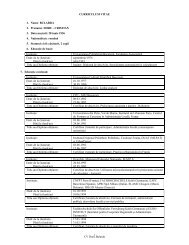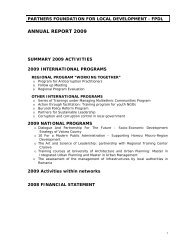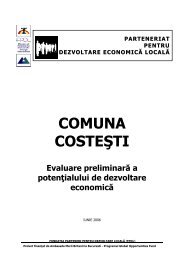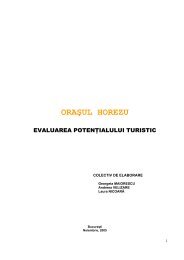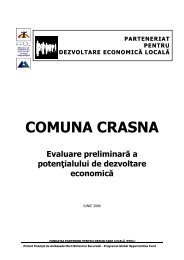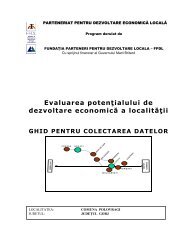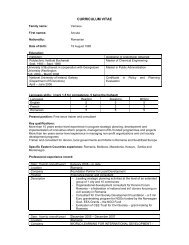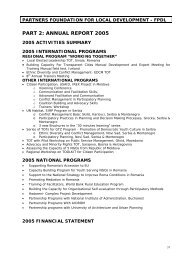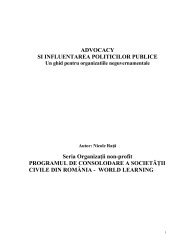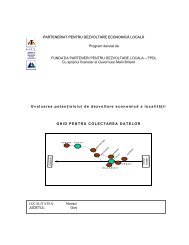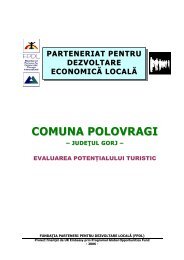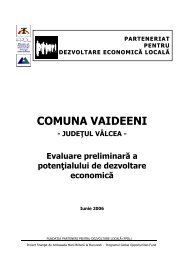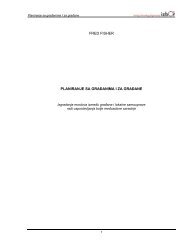Organizational Development: A Manual for Managers and ... - FPDL
Organizational Development: A Manual for Managers and ... - FPDL
Organizational Development: A Manual for Managers and ... - FPDL
Create successful ePaper yourself
Turn your PDF publications into a flip-book with our unique Google optimized e-Paper software.
In a world without chaos, the survivability of an organism would depend on: a) individual <strong>and</strong><br />
generic experience that had selected acceptable structures <strong>and</strong> patterns of behaviour, <strong>and</strong> b) the<br />
model of reality (‘mental map’) that was <strong>for</strong>med out of this experience <strong>and</strong> is used <strong>for</strong> making<br />
rational choices (when there is a choice). In this case, a more complete <strong>and</strong> durable memory of the<br />
previous experience is a pre-condition <strong>for</strong> more adequate behaviour. Each result of action or nonaction<br />
corrects <strong>and</strong> determines the same model <strong>and</strong> enables prediction that may ultimately be as<br />
exact as one wants (‘Laplace’s demon’). Un<strong>for</strong>tunately or <strong>for</strong>tunately – such a world does not exist.<br />
In a chaotic world, organisms are able not only to adapt to the certain environment, but also adapt<br />
to the uncertainty of the environment that is caused by chaos. This chaos may be more or less<br />
bounded or ‘determined’, but cannot be eliminated. It is impossible to know what will happen<br />
tomorrow. In the best case, it is only possible to predict that something ‘may happen’ <strong>and</strong><br />
something else ‘is unlikely to happen’.<br />
There is an interesting memory dilemma. On the one side – survivability of an organism depends<br />
on the rate it stores in memory its impressions from interrelations with its environment (mapping<br />
the world). On the other side – inertia of the memory may not serve well if something was not<br />
<strong>for</strong>gotten in the right time. In a changing world, an organism must revise <strong>and</strong> correct its mental<br />
map – thus important condition is the rate of erasing ‘achievements’ based on old experience when<br />
these are not relevant any longer. When the world is changing rapidly – then learning ‘how it is<br />
now’ must also be fast, as well as leaving behind ‘that which is not relevant any longer’.<br />
Stability in a contemporary world gives way to dynamic (predictable) change <strong>and</strong> chaos<br />
(unpredictable change). Thus, the starting point in choosing an organism’s behaviour is no longer<br />
the status quo, but change itself. To be more precise – not only the changes themselves, but also<br />
cause-effect relationships, <strong>and</strong> regularities <strong>and</strong> patterns of change that include conditions <strong>and</strong><br />
levels of predictability <strong>for</strong> certain processes.<br />
In the stream of changes, any new state is unpredictable - but possible directions are predictable,<br />
because the world, in general, remains the same <strong>and</strong> follows the same laws. It is like gas in a<br />
vessel – it remains the same, although molecules are in permanent <strong>and</strong> chaotic movement <strong>and</strong> the<br />
situation on the micro-level never repeats. The only way to underst<strong>and</strong> what is permanent in the<br />
world is to observe how it changes.<br />
Thus, behavioural conditions <strong>for</strong> survival include:<br />
• Adequate reaction to the actual situation (‘map of current situation’ is needed);<br />
127



